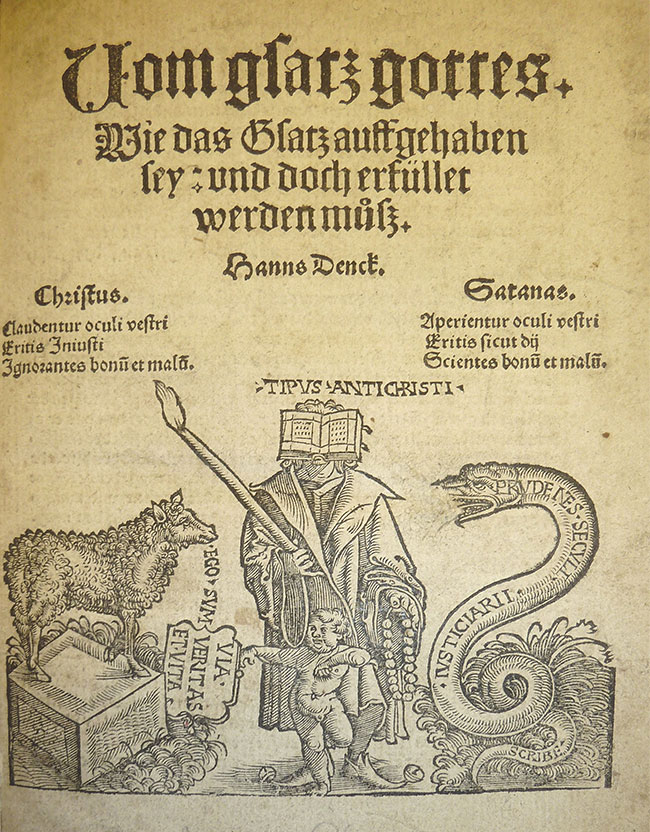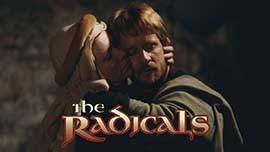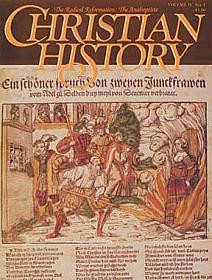HANS DENCK WAS FORCED INTO THE COLD ON CHRISTMAS EVE

[Above: Hans Denck's Vom Gesetz Gottes (Of the Law of God), Flickr, public domain owing to age.]
“NO ONE MAY TRULY KNOW CHRIST except one who follows him in life,” wrote Hans Denck. His behavior showed how seriously he took his words. Even his opponents acknowledged that his life was pure, his teaching clear (although they thought it wrong), and his demeanor gracious.
Born in Bavaria around 1500, Denck applied himself to biblical and classical studies. His learning enabled him to hold various instructional and publishing jobs from an early age.
His first important position was as a schoolmaster in Regensburg. However, he left it after a few years for more education and a desire to increase his spiritual knowledge. He went to Basel in 1523 where he attended lectures by Oecolampadius and worked as a corrector for two print shops.
Oecolampadius recommended Denck for a teaching position in Nuremberg. Denck prospered as head of St. Sebaldus School and married. His wife took boarders to supplement their income. But when Denck forbade his students to serve at the altar during Roman Catholic services, Nuremberg’s leaders rebuked him, saying he had overstepped his authority. Soon a painter implicated him as holding doubtful views on the sacraments. After questioning him in January 1525 and requiring him to provide written statements of his views, Lutheran reformer Osiander banned him from the city and made him swear never to return within ten miles of the city on penalty of death. All his property was confiscated to support his wife and baby who remained behind.
During the next several months Denck lived in unsettled conditions, throwing in his lot with pacifist Anabaptists. Late in 1525, he settled in Augsburg, where he was allowed to tutor Latin and Greek. Leadership of the local Anabaptists fell to him and their numbers more than doubled under his care from five hundred to eleven hundred.
While in Augsburg, Denck published three treatises. In one he accused Luther of preaching cheap grace and he urged Christians to actually live by the law of love. In another he argued for freedom of the will against Luther’s Augustinian interpretation that placed everyone in spiritual bondage. In the third, he declared that Scripture requires the Holy Spirit’s illumination if we are to resolve its paradoxes. Called to account by furious Lutherans, Denck fled, a decision that was well-advised. Augsburg’s Lutheran reformer, Rhegius, soon began executing Anabaptists.
Denck made his way to Strasbourg which had a reputation for toleration, arriving late in October. Strasbourg’s toleration was short-lived. On 22 December 1526, Martin Bucer debated Denck in front of four hundred citizens. On the 23rd, Denck was ordered to leave the city next day. And so, on this day, Christmas Eve, 24 December 1526, Denck trudged into the cold.
Early in January 1527, Denck entered Bergzabern, in the Palatinate, a region of Germany on the Rhine known as a religious alphabet soup. However, a local minister challenged Denck’s rejection of infant baptism. Again Denck had to move.
He settled in Worms. There he helped prepare a translation of the Old Testament prophets from Hebrew. Although the work was done in just three months, contemporaries praised its quality. This saw print in April. That same year, Denck published two more books, one on God’s love, the other on tough questions such as predestination, the Spirit’s witness in our hearts, and the human will.
During the summer he traveled back to Augsburg where he attended the Anabaptists’ Martyrs’ Synod (so-called because almost all of its participants soon died as martyrs). Denck drafted its statement of belief.
Denck would not die a direct martyr. However, hardships had worn him out. In October he secretly entered Basel because Anabaptists were barred from the city. Sick, he appealed for shelter to Oecolampadius, who extended it, but required Denck to provide a written statement of his beliefs. Denck complied. Although he repudiated none of his essential teachings, Oecolampadius later printed this as a recantation.
By then, Denck was past caring. He had died 27 November 1527 of the Black Plague.
—Dan Graves
---------
Stream the drama The Radicals at RedeemTV. It tells the stories of Anabaptist contemporaries of Denck.
[The Radicals can also be purchased at Vision Video]
and Christian History 5 The Radical Reformation covers the movement at depth








